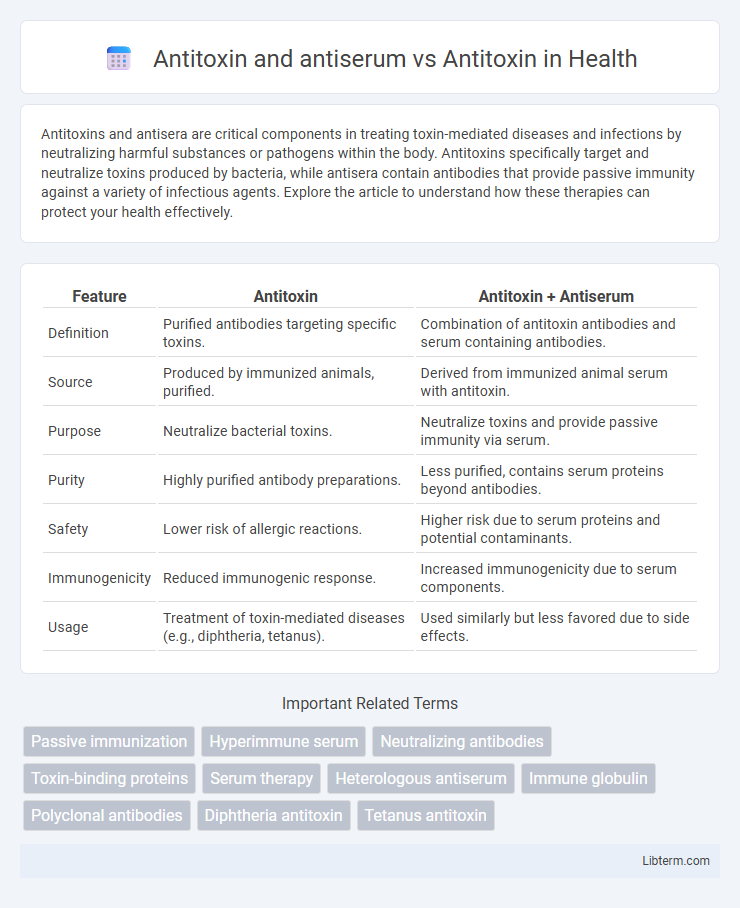Antitoxins and antisera are critical components in treating toxin-mediated diseases and infections by neutralizing harmful substances or pathogens within the body. Antitoxins specifically target and neutralize toxins produced by bacteria, while antisera contain antibodies that provide passive immunity against a variety of infectious agents. Explore the article to understand how these therapies can protect your health effectively.
Table of Comparison
| Feature | Antitoxin | Antitoxin + Antiserum |
|---|---|---|
| Definition | Purified antibodies targeting specific toxins. | Combination of antitoxin antibodies and serum containing antibodies. |
| Source | Produced by immunized animals, purified. | Derived from immunized animal serum with antitoxin. |
| Purpose | Neutralize bacterial toxins. | Neutralize toxins and provide passive immunity via serum. |
| Purity | Highly purified antibody preparations. | Less purified, contains serum proteins beyond antibodies. |
| Safety | Lower risk of allergic reactions. | Higher risk due to serum proteins and potential contaminants. |
| Immunogenicity | Reduced immunogenic response. | Increased immunogenicity due to serum components. |
| Usage | Treatment of toxin-mediated diseases (e.g., diphtheria, tetanus). | Used similarly but less favored due to side effects. |
Introduction to Antitoxins and Antisera
Antitoxins and antisera are both immunological agents used to neutralize toxins or pathogens, with antitoxins specifically targeting toxins produced by bacteria, such as those from diphtheria or tetanus. Antisera contain a broader range of antibodies derived from immunized animals or humans, providing passive immunity against various infectious agents. The production of antitoxins involves immunizing animals with specific toxins to harvest high-affinity antibodies, whereas antisera may be prepared to contain polyclonal antibodies against multiple antigens.
Defining Antitoxins: Mechanism and Uses
Antitoxins are specific antibodies produced in response to bacterial toxins, neutralizing their harmful effects by binding directly to the toxin molecules. Antiserum contains a mixture of antibodies, including antitoxins, and is used to provide passive immunity against various toxins and pathogens. Antitoxins play a critical role in preventing or treating diseases caused by toxin-producing bacteria such as diphtheria and tetanus.
Understanding Antiserum: Composition and Function
Antiserum is a biological product containing polyclonal antibodies derived from the blood serum of immunized animals, designed to provide passive immunity by neutralizing specific toxins or pathogens. Unlike antitoxins, which are highly purified antibody fragments specifically targeting a toxin, antiserum contains a broader mixture of antibodies, allowing it to address multiple antigenic determinants. The primary function of antiserum is to bind and neutralize antigens rapidly, facilitating immediate immune defense before the host's own immune system mounts a response.
Antitoxin vs Antiserum: Key Differences
Antitoxin contains antibodies specifically targeting toxins produced by pathogens, whereas antiserum refers to blood serum containing a broad range of antibodies against various antigens. Antitoxins are typically derived by immunizing animals with toxins to neutralize substances like diphtheria or tetanus toxins, while antiserum may be collected from humans or animals exposed to a specific pathogen or vaccine. The primary difference lies in specificity: antitoxins neutralize toxins, whereas antiserum provides passive immunity against a wider array of infectious agents.
Production Processes: Antitoxin and Antiserum
Antitoxins and antiserums are both produced by immunizing animals with specific pathogens or toxins to stimulate antibody generation; however, antitoxins are purified antibodies specifically targeting bacterial toxins, while antiserums contain a broader range of antibodies against entire pathogens or multiple antigens. The production process for antitoxins involves toxin detoxification and repeated immunizations to achieve high antibody titers, followed by plasma collection and purification of the neutralizing antibodies. In contrast, antiserums are harvested directly from the serum of immunized animals without the extensive purification required for antitoxins, resulting in a more generalized antibody preparation.
Therapeutic Applications: When to Use Each
Antiserum contains polyclonal antibodies derived from immunized animals or humans, providing broad-spectrum protection ideal for rapid neutralization of toxins and pathogens in acute poisoning or infections, whereas antitoxins are specific antibodies targeting definitive toxins, commonly used for diseases like diphtheria and tetanus. Therapeutic application of antiserum suits conditions requiring immediate immunological defense due to its diverse antibody content, while antitoxins are preferred when precise neutralization of a known toxin is necessary to minimize adverse reactions. Selection depends on toxin specificity, urgency of treatment, and the immune response required for effective neutralization and recovery.
Efficacy and Safety Profiles
Antitoxins and antisera differ significantly in their efficacy and safety profiles, with antitoxins providing targeted neutralization of specific toxins, resulting in faster therapeutic action and fewer allergic reactions. Antisera, derived from pooled animal or human plasma containing polyclonal antibodies, offer broader pathogen coverage but carry higher risks of serum sickness and hypersensitivity due to immunogenic components. Clinical data highlight antitoxins' superior safety and rapid toxin inactivation, making them preferable for acute toxin-mediated conditions.
Clinical Case Studies: Antitoxin versus Antiserum
Clinical case studies demonstrate that antitoxin, specifically purified antibodies targeting bacterial toxins, offers targeted neutralization with reduced risk of serum sickness compared to antiserum, which contains a heterogeneous mix of antibodies from immunized animals. Antitoxin's clinical effectiveness is evident in treating diphtheria and tetanus by neutralizing circulating toxins promptly, minimizing tissue damage. Antiserum, while historically significant, poses higher immunogenicity risks and variable potency, underscoring the preference for antitoxins in modern therapeutic protocols.
Limitations and Challenges
Antitoxins are specific antibodies designed to neutralize bacterial toxins, but their effectiveness can be limited by the time needed for production and potential hypersensitivity reactions. Antiserum contains a broader range of antibodies, offering wider protection but posing risks such as serum sickness and batch variability. Both therapies face challenges including short half-life, limited availability, and the emergence of toxin variants that reduce neutralization efficacy.
Future Perspectives in Antitoxin and Antiserum Therapy
Future perspectives in antitoxin and antiserum therapy emphasize advancements in monoclonal antibody technology and recombinant DNA techniques, enhancing specificity and reducing adverse reactions. Innovations in synthetic biology enable production of tailored antitoxins with improved efficacy against evolving bacterial toxins. Integration of rapid diagnostics with personalized antiserum formulations promises to revolutionize treatment protocols for toxin-mediated diseases.
Antitoxin and antiserum Infographic

 libterm.com
libterm.com